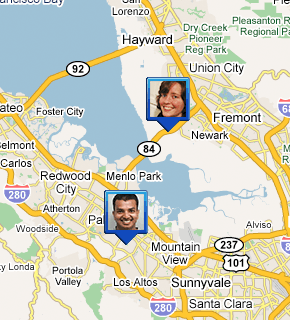
Report: Google's Latitude service could be used for location tracking.
Mobile healthcare technologies are particularly well suited for disease management, medication adherence, safety monitoring, health education and behavior modification for wellness, especially among older populations, according to an organization that supports technology to encourage independent and community-based living for seniors.
"As today’s older adults are more mobile than their predecessors, mobile devices are becoming an increasingly essential tool for an active population," the Center for Technology and Aging, Oakland, Calif., says in a report entitled, "mHealth Technologies: Applications to Benefit Older Adults." The report is dated March, but it wasn't widely publicized until late last week.
"mHealth changes the traditional delivery of healthcare, allowing for continuous, pervasive healthcare anytime, anywhere," Center for Technology and Aging director David Lindeman stated in a press release. "With mHealth, providers, caregivers, and patients have the opportunity to continuously monitor health conditions and access health information outside of either the physician's office or the patient's home. It promotes efficiencies in care management and improves individual and population health outcomes."
However, the report notes, mobile health is only beginning to define its potential for seniors and their caregivers, much less realize that potential. The report does, however, reference an October 2010 column by MobiHealthNews editor Brian Dolan, who argued that adoption of mobile health apps was much stronger than other publications had characterized it as.
One purpose of the paper is to describe opportunities for the organization's Mobile Health Diffusion Grants Program. Next month, the Center for Technology and Aging will announce the winners of six one-year grants, worth a total of $500,000.
Potential resides in at least five broad categories. "mHealth technologies can help slow progression of chronic disease and ensure continued recovery after being discharged from an acute care setting; assist with medication adherence by providing medication reminders and alerting caregivers to missed medications; alert caregivers and prompt intervention when a vulnerable older adult is injured or in harm’s way; provide patient and caregiver access to personal health information, and deploying or communicating wellness and preventive care protocols," the report says.
The report discusses some specific technologies to address these areas as "a starting point for consideration." For disease management, for example, the Center for Technology and Aging cites the MedApps HealthPal, an FDA-approved handheld device that automatically collects and analyzes data from wireless monitors in the home.
The report also examines issues such as the difference between user-activated and passive monitoring systems to detect falls, and also discusses free and low-cost technologies such as SMS and Google's Latitude location tracker. The latter could be particularly useful for keeping tabs on patients with dementia or Alzheimer's disease.
Also becoming important is social networking. "Social networking and care coordination technologies allow communities of older adults to connect, share knowledge and provide support to other older adults and their care providers. These social networks utilize a variety of means to facilitate communication among patients including discussion groups, chat, messaging, email, video and file-sharing," the report says.
While most social networking still takes place through PC-based Web browsers, mobile technologies are helping to make social networks more widely accessible and useful for healthcare. "For example, care coordination technologies utilize SMS text or email messaging systems for medical appointments reminders, chronic disease management, and health surveys," according to the report.


















